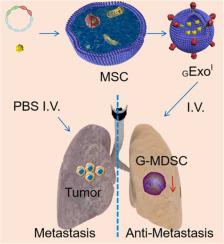Nano Today ( IF 13.2 ) Pub Date : 2022-08-27 , DOI: 10.1016/j.nantod.2022.101597
Xiaoqing Han , Luopeng Bi , Yunyun Wu , Jiao Yan , Xiaqing Wu , Runxiao Zheng , Yingying Sun , Hua Zhang , Zhenxin Wang , Yanbo Wang , Haiyuan Zhang

|
Premetastatic niche (PMN) is a prerequisite for initiation of tumor metastasis. Targeting prevention of PMN formation in distant organs is becoming a promising strategy to suppress metastasis of primary tumor. Based on “organotropic metastasis”, melanoma tends to metastasize to lungs, where granulocytic myeloid-derived suppressor cells (G-MDSCs) recruitment in lungs significantly contributes to the PMN formation. Herein, functional exosomes (GExoI) were designed to present pulmonary targeting peptide GFE1 on the membrane and load PI3Kγ inhibitor (IPI549) inside, aiming at suppressing postoperative lung metastasis of melanoma. In postoperative mice model, intravenously injected GExoI could significantly accumulate in lungs and release IPI549 to block G-MDSCs recruitment through interfering with CXCLs/CXCR2/PI3Kγ signaling. The increased percentages of CD4+ T cells and CD8+ T cells in lungs could transform microenvironment from immunosuppression to immunostimulation, leading to metastasis inhibition. This study suggests an effective anti-metastasis strategy of targeting prevention of PMN formation through specifically blocking G-MDSCs recruitment.
中文翻译:

用于有针对性地预防转移前生态位形成和抑制术后黑色素瘤肺转移的基因工程外泌体
转移前生态位 (PMN) 是启动肿瘤转移的先决条件。靶向预防远处器官中 PMN 的形成正在成为抑制原发性肿瘤转移的有前景的策略。基于“器官性转移”,黑色素瘤倾向于转移到肺部,其中肺中的粒细胞髓源性抑制细胞 (G-MDSCs) 募集显着有助于 PMN 的形成。在此,功能性外泌体(G Exo I)被设计为在膜上呈递肺靶向肽GFE1,并在内部负载PI3Kγ抑制剂(IPI549),旨在抑制黑色素瘤术后肺转移。在术后小鼠模型中,静脉注射G Exo I通过干扰 CXCLs/CXCR2/PI3Kγ 信号传导,可显着积聚在肺中并释放 IPI549 来阻断 G-MDSCs 的募集。肺中CD4 + T细胞和CD8 + T细胞百分比的增加可以将微环境从免疫抑制转变为免疫刺激,从而抑制转移。该研究提出了一种有效的抗转移策略,通过特异性阻断 G-MDSCs 的募集来靶向预防 PMN 的形成。































 京公网安备 11010802027423号
京公网安备 11010802027423号